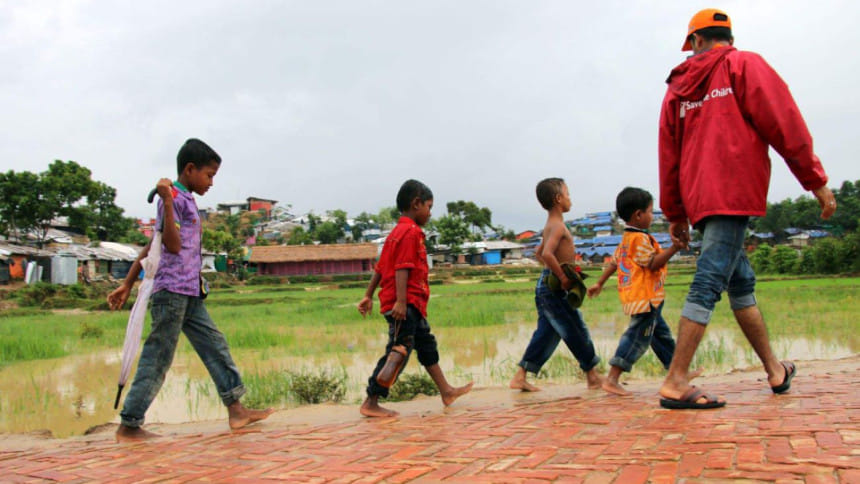Looking Back

It's been one year since the world was horrified by images of emaciated women, men and children walking with just their worldly possessions into the safety of Bangladesh. A year since we learned that a frenzied wave of violence had erupted in Myanmar, leading to what the UN has called "a textbook example of ethnic cleansing." A year since the people of Bangladesh opened their doors and gave up large swathes of land, so that this persecuted and scarred people could find a safe refuge, without fear of being murdered in their beds.
I've been based in Cox's Bazar for nine months of that year and, through my work with Save the Children, have had the unique opportunity to interview dozens of Rohingya children and their families about their experiences in Myanmar. So many of the stories I've heard have been horrific.
There was a girl who was raped by 12 men and left for dead, and couldn't stop asking what she had done to deserve such a fate. I met a little boy who stopped talking during the violence and hasn't uttered a word since. I spoke to an old woman delirious with sorrow after all her children and grandchildren were massacred around her.
On one of my first days in the camps, I interviewed a 12-year-old girl who told me it had taken her family ten hours to swim across the Naf River, clutching onto empty water drums. She arrived in Bangladesh terrified, wet, and exhausted.
I heard on two separate occasions different families recount how, on their journey, they stopped in a deserted village to shelter for an evening and found a house piled with decaying bodies. The first time I heard the story I cried. The second time, I was dumbstruck. How many houses of bodies were there in Myanmar?
For many who fled Myanmar the trauma runs deep and long. Just last month in Cox's Bazar I went to speak to a Rohingya man about a nutrition supplement we had provided for his son. As soon as I walked into his home the man burst into tears. He was overwhelmed by the memory of his traumatic experiences escaping Myanmar and couldn't stop crying. In place of the interview we ended up providing emotional support and a referral for counselling.
In many ways the past year has been one of disappointments. It's been disappointing to see the lack of meaningful progress to bring the perpetrators to justice, or to create the conditions where the Rohingya people would feel safe to voluntarily return home. It's been disappointing to see the Myanmar government continue to restrict access to humanitarian actors in northern Rakhine State, preventing essential aid from being delivered to children and their families in desperate need. And it's been disappointing to see the global community rely so heavily on the generosity of Bangladesh to host the Rohingya refugees, without putting more pressure on Myanmar to solve the root causes of the crisis.
But despite the horrors and disappointments, there have been many glimmers of hope too. It's been incredible to see how Bangladesh has evolved to become a world leader in humanitarian response. It's been inspiring to work alongside hundreds of passionate, dedicated and bright Bangladeshi colleagues, who are a credit to their families and their nation. And it's been encouraging to see how Rohingya children have been able to adapt to their new situation. No matter how difficult life is in the camps, the sight of a laughing child walking into a learning centre is enough to make you smile.
But now it's time to push for a change. We need to ensure this year doesn't become another year, and then another, and then another. It's not fair to Bangladesh or the Rohingya children. There are ways to fix this.
The government of Myanmar must ensure that Rohingya refugees who wish to return to Myanmar can do so safely, voluntarily and with dignity. To make such a return sustainable, the government of Myanmar must ensure Rohingya freedom of movement and a realistic and timely plan for the restoration of their citizenship. The Rohingya people currently living in Myanmar must have the same access to health and education services and livelihood opportunities as all other residents. They must be able to work, to learn, to move around their own country freely and safely.
Finally—critically—all those who planned, implemented and facilitated the campaign of mass atrocities in Rakhine State must be brought to justice. There needs to be accountability for those bodies lying in empty houses.
Daphnee Cook is Communications and Media Manager, Save the Children, Rohingya Response.





Comments